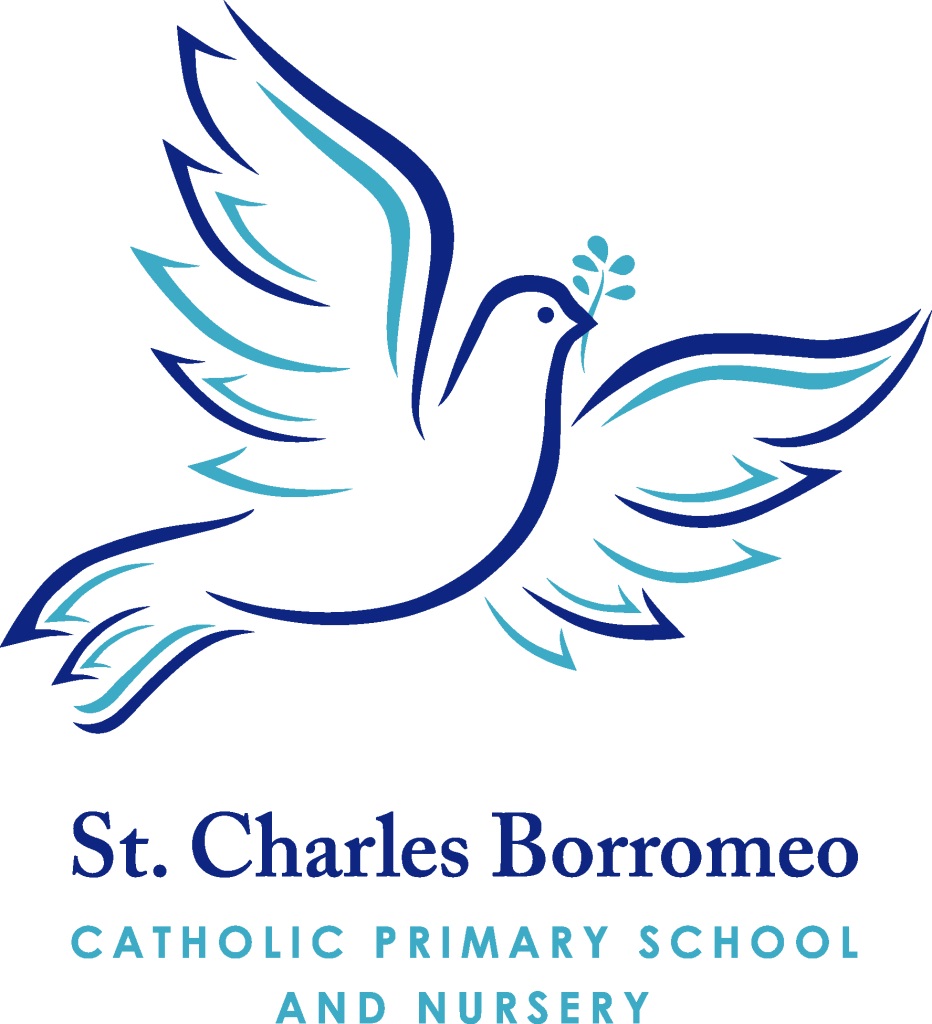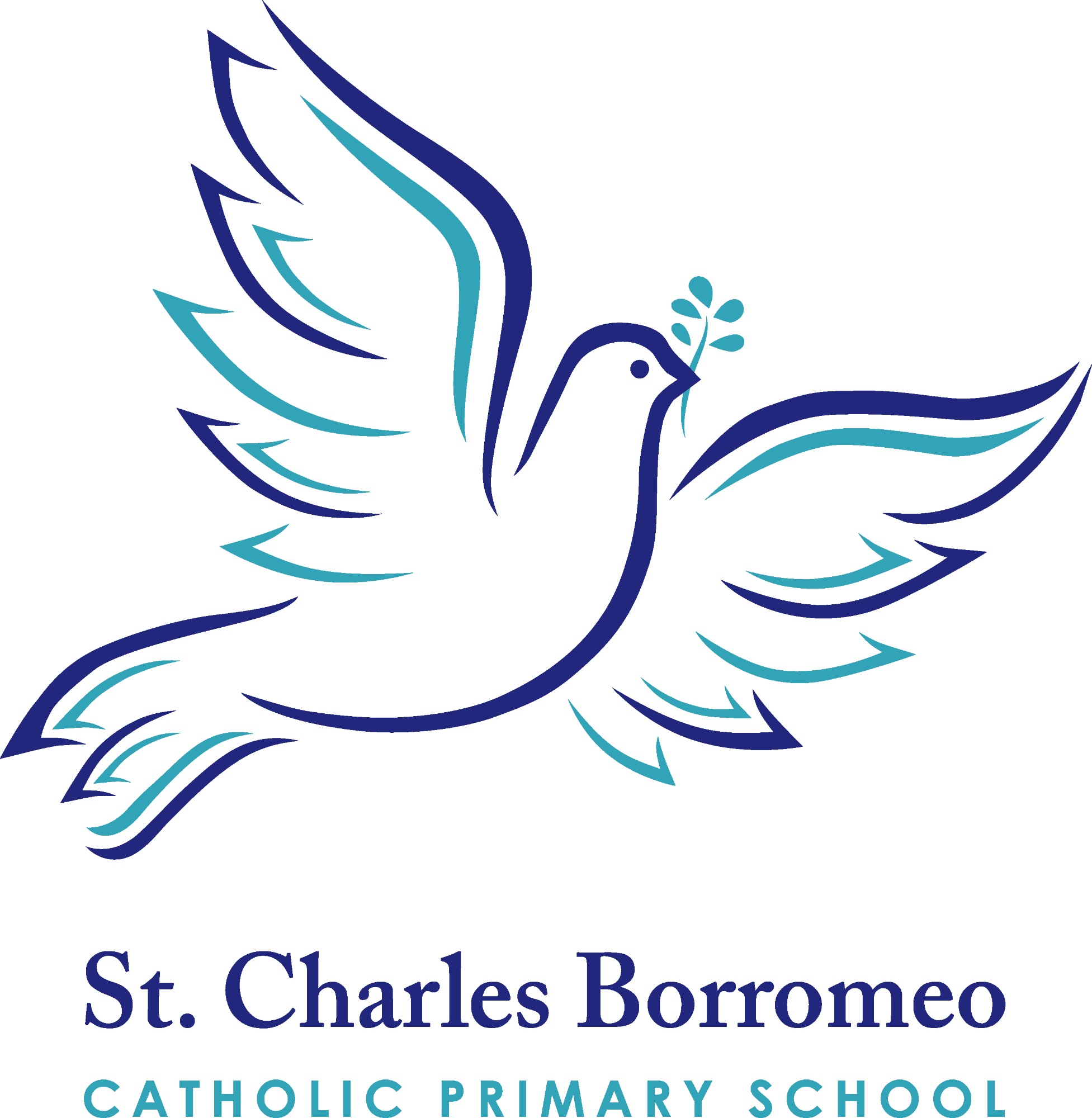Curriculum
For termly curriculum information for each year group, please choose the 'Year Groups' link on the right hand side of this page.
Please direct any questions you may have regarding the curriculum that we follow via the school office on tel. 01932 842617 or by eMail info@stcharlesb.surrey.sch.uk
OUR CURRICULUM

‘Help us to be the best that we can be and follow St Charles Borromeo by helping others’
(extract from our school prayer)
CURRICULUM INTENT
At St Charles Borromeo we have designed a curriculum which we believe will prepare our children for life beyond primary school. Everything we do is underpinned by our Gospel values and ethos, with 4 key words highlighting our learning journey through school, namely:
Grow, Learn, Work, Follow
We will grow in our Catholic faith by praying and worshipping together.
We will work hard so that we can learn and be the best that we can be.
We will work together in our families, school, and parish, and with those both near and far, to make our world a better place for us all.
We will follow the example of Jesus and his teachings in all that we say and do.
Our aim is for all of our children to:
- Grow to be confident, inquisitive and reflective learners who take risks and persevere
- Learn to be respectful and tolerant children who are kind to themselves and others, so that they can be the best that they can be
- Work independently and collaboratively with self-discipline and resilience
- Follow the example of Jesus to live out our faith and values in an ever-changing world
Through a rich, broad and challenging curriculum which focusses on the whole child we want our children to have the knowledge and skills to enable their learning to progress effectively. We want our St Charles learners to be:
- Confident and responsible
- Loving and empathetic
- Independent in thought and work
- Resilient and to learn from their mistakes
- Be inquisitive and outward looking
- Community spirited
- Reflective
CURRICULUM IMPLEMENTATION
As a Catholic school, our Catholic education remains at the core of everything we do. We recognise Religious Education as a core subject, following the Diocesan wide curriculum, ‘Come and See’. We celebrate difference and recognise that every child is made in the image of God. Children are encouraged to serve others, providing an opportunity to help their classmates through a mastery approach as well as using the local and wider context to serve others through community and charitable projects. Our links with our Parish are strong.
By the end of EYFS (Nursery and Reception), children will have the personal and practical skills and knowledge necessary to progress confidently into KS1. Children will continue to build upon this knowledge, these skills and their application, through diverse experiences, across all areas of the curriculum. They will progress from Key Stage One to Key Stage Two, where we will ensure that they are equipped and prepared for their transition into the next phase of their education. They will leave our school fully prepared for the next stage, leaving as happy, safe and valued individuals who are ready and motivated to learn more. They will have high aspirations and expectations for the future.
Our children are encouraged to discuss their learning and through a mastery approach have a deeper understanding of it. Children are encouraged to support and challenge in lessons, with learners supporting one another in mixed ability pairings. Children are encouraged to self-assess from an early age and take ownership of their learning.
Our curriculum embraces a number of approaches, with children being taught subjects discretely and where appropriate, using cross curricular links. We believe children should be able to differentiate between National Curriculum subjects but also make connections between them. Our curriculum is also fluid as we make the most of ad hoc opportunities should they arise through local, national and world events.
We are an inclusive school and aim for all our learners to grow from their own particular starting points. Children are supported to be the best that they can be taking into account any special educational needs and disabilities. Our Pupil Premium children are supported through a range of activities and interventions.
Maths is taught through a Mastery approach, using a range of supporting material such as Power Maths and White Rose. A mastery approach demands that the curriculum is delivered in small steps, meaning that pupils of all ages acquire a deep, long-term, secure and adaptable understanding of the subject. We work closely with the Maths Hub and make use of continuous professional development to enhance both the teaching and learning in the school. We have a real focus on fluency whereby the children build on and refine their arithmetical skills on a daily and weekly basis.
In Literacy we believe that from an early age ‘talk for learning’ is essential if our learners are to become confident speakers but writers too. Children are given opportunities to speak in public whether it be within the classroom, in the church or visiting the wider community.
We teach phonics in EYFS and KS1 using Little Wandle Letter and Sounds, supported by a range of resources and practical opportunities. In the spring of 2022 we explored the use of Little Wandle Letters and Sounds provision and implemented it in the summer of 2022 which will also include a restructuring of reading books for younger children. We currently use a wide range of reading materials, covering fiction and non-fiction, with an emphasis not only on reading with expression, but on comprehension too. The methods of teaching reading are multi-faceted, using all the strategies that enable children to bring meaning to text. We currently use book bands which are a proven approach to developing successful readers. The Book Band system helps schools to carefully grade their books by difficulty level. Reading at an early age focuses on these book bands before the children become ‘free readers’. Our children are benchmarked regularly so that we can monitor progress.
In Key Stage 2 the children use an online reading comprehension program called Read Theory, ensuring that children not only read for pleasure but develop their comprehension skills too. Class readers are used in KS2 as a means of exploring texts in more detail during whole class reading lessons.
PSHE is taught through the Connect Programme, but many learning opportunities arise through links with the local and wider community. Many links are made through values education, our assemblies, collective worship and prayer. The whole child is recognised in everything we do, and pastoral support is provided throughout the curriculum and throughout the day, so that all children feel safe and valued. The emotional and mental well-being of children and staff is at the heart of our school. One to one, group support, counselling, Rainbows and ELSA are provided.
Sex and Relationships education is taught through a whole school policy and scheme ‘Journey in Love’ and where possible integrated into other areas of the curriculum such as Religious Education, Science and PSHE. It is always taught within the context of the church’s teaching on sexual, loving relationships. Children are given opportunities to ask questions in a safe and supportive environment.
Where possible subjects are enhanced through community links. We believe in making the most of any opportunity presented to us, whether it be links with local sports clubs/schools, secondary schools, organisations or professionals with expertise to share.
Technology is used to enhance learning and teaching, as well as being taught explicitly through computing and the safe use of technology. We have a bank of Ipads and laptops which are used throughout the curriculum.
Children take great pride in their learning and enjoy representing their school. An example of this is that all children who wish to represent their school in sport are given an opportunity to do so. This helps to instil a sense of pride but also gives the children confidence. Approximately 20% of children learn a musical instrument via Surrey Performing Arts peripatetic teachers in addition to class music lessons.
Curriculum planning evolves as it takes into account new initiatives and resources, and where possible, the children’s interests are taken into consideration as well as the local and wider context. Lessons take into account skills and knowledge, with new learning being evidenced across topics with KWL grids being used (Know, would like to know and what is learnt). Children respond to feedback from their teachers and each other. Where possible, children are given feedback during and at the end of lessons, marking work so that feedback is meaningful and immediate. Self and peer assessment develops confidence and a deeper understanding of the subjects covered.
Wherever relevant and possible, we aim to enrich our curriculum with special events, workshops, guest speakers and educational visits.
Further details regarding our curriculum provision can be found in our curriculum area on our website as well as through the curriculum information slides to parents.
Pupil voice indicates that children enjoy their learning and are proud to represent their school.
CURRICULUM IMPACT
The impact of the curriculum is monitored though a triangulation of outcomes: making effective use of qualitative and quantitative outcomes, curriculum review, monitoring of books and displays, lesson learning walks, discussions with teaching staff, pupils, governors, Xavier Trust and parents. The school improvement plan is guided by feedback from all stakeholders on an annual basis.
The desired outcomes of the curriculum will ensure that our pupils are happy and well-rounded, ready to embark on the next step in their education. They will be equipped with the foundations and skills to achieve success in later education. Pupils will have an understanding of what they are good at and have developed skills to face their challenges, all while knowing they can make a difference within the local, Catholic and wider community.
Please click on the links to the right to view termly curriculum overviews for each year group, or to view subject specific curriculum information.
